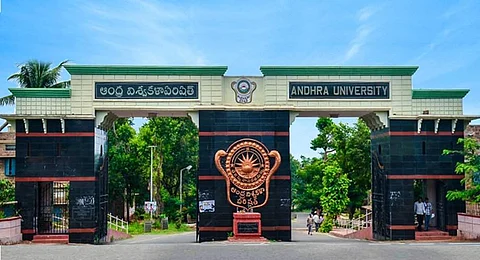Andhra University notes on difficulties of coping in the pandemic in the informal sector
The Centre for Study of Social Exclusion and Inclusive Policy, (CSSEIP), Andhra University organised a National Webinar on "Informal Sector in India during COVID-19 Times: Issues and Perspectives" on Saturday. Prof V Krishna Mohan, Registrar, Andhra University inaugurated the event.
Speaking as Chief Guest on the occasion, he explained how the pandemic had impacted and caused misery to human lives. Even in normal times, the informal workers do not receive proper wages; work in poor conditions without any rights, insurance, pension, etc, he told. The informal sector and those engaged and dependent on this sector is the worst hit during the COVID times, noted the Registrar.
He mentioned that 80 percent of the workforce employed in the informal sector found it difficult to meet both ends. He stated that the informal workers had depended and continued to sustain themselves on the welfare schemes launched by the Governments at the Centre and the States during the lockdown imposed due to COVID-19. The voluntary organisations also came to the rescue of the people in the informal sector that includes the workers and petty traders by supplying food items during this critical period, added Prof Mohan.
Presiding over the programme, Prof P Rajendra Karmarkar, Principal, College of Arts and Commerce, Andhra University stated that the informal sector workers have several problems like social security, low and irregular wages and often they are less than minimum wages fixed for a worker. He pointed out the webinar is quite relevant today, as these workers are passing through a difficult phase and are yet to completely recover from the effects of COVID-19.
Director of the Centre, Dr P Subba Rao welcomed the gathering and outlined the objectives of the programme. Referring to the Economic Survey estimates (2018-19), he noted that around 93 percent of the workforce (42 crores) are in the informal sector, who are still exploited by the employers and are neglected.
He referred to the reports of some agencies like the Centre for Monitoring Indian Economy (CMIE) and stated that overall, 121.5 million jobs were lost in India, and out of it 91.2 million were informal jobs such as small traders, hawkers, daily wage labourers, etc. Prof K Sekhar, Coordinator, RGNIYD, North-Eastern Regional Centre, Arunachal Pradesh in his address highlighted the plight of the informal sector workers and small petty businesses like flower vendors, vegetable vendors tea stall owners, street and snack food vendors with some case studies in Chandigarh and Chennai.
Prof Anil Kumar Mohapatra, Department of Political Science, Fakir Mohan University, Nuapadhi in his address felt the need to extend social protection to the informal sector and noted that the works under Mahatma Gandhi National Rural Employment Guarantee Scheme be extended to agricultural workers for 200 days in a year. He highlighted how the Supreme Court of India is interpreting "the right to livelihood" and the States must ensure implementation of these judgments. The programme concluded with a formal vote of thanks by Dr N Babavali, CSSEIP.


